Steroids, in Our Systems and in the Ecosystem
Glucocorticoids are among the most widely prescribed drugs in the world. Applications for this class of drug have grown over the decades. So too has an awareness of the dangers they present...both to humans who take them, and to animals that absorb them because the drugs have leached into the environment.
Ptereleotris Zebra Fish:
Affected by Glucocorticoids in the Environment
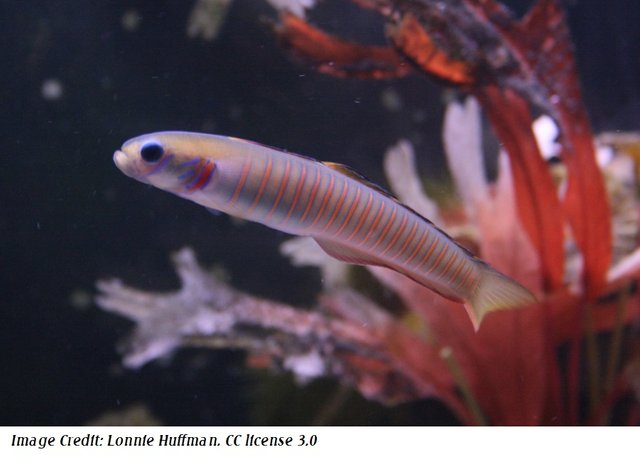
Observed changes:
In a controlled study, five glucocorticoid formulations were introduced. Overall, some of the changes noted in the fish: liver chemistry, which influences circadian rhythm, glucose metabolism and immune response; the upregulation and down regulation of certain chemicals by the brain; decrease in the number of mature oocytes.


In 1948, cortisone was used successfully, for the first time, to treat a patient with rheumatoid arthritis.Today, the class of drugs to which cortisone belongs, glucocorticoids, has become the mainstay of treatment for between 56-68% of patients who have rheumatoid arthritis.
Glucocorticoids--GCs--are involved in a number of vital life processes. They help to control: metabolism, electrolyte balance, immune system function, mood stability, cognition, reproduction, cardiovascular system and growth. So, an excess or deficit of GCs can have a devastating effect on well-being, and even survival.

While GCs were first used to treat rheumatoid arthritis, it was discovered over time that they were powerful anti-inflammatories
and could be helpful in a number of conditions. It is likely that
readers of this post have used some form of GC. These medicines are
prescribed to alleviate skin rashes, eye inflammation, asthma,
bronchitis and a host of other maladies, including serious autoimmune
diseases. GCs are even useful in the treatment of some cancers and, in certain circumstances, acute bouts of flu.



Rosy Red Fathead Minnows
Undergo Changes Related to Glucocorticoid Exposure in Controlled Experiments
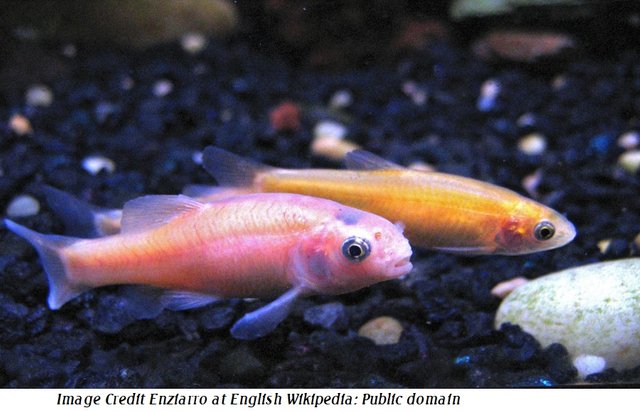
Some observed changes:
Decrease in the number of lymphocytes, plasma glucose increased, and female fish developed secondary sexual characteristics.

Glucocorticoids and the HPA Axis

The therapeutic effect of GCs resides in the role they play in what is known as the HPA Axis. This is a coordinated interaction between the hypothalamus, pituitary gland and adrenal glands.
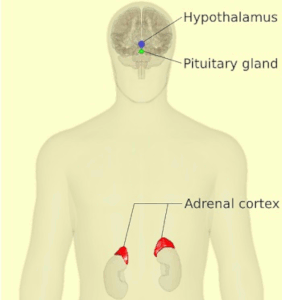
The hypothalamus receives a message that the body is under stress. The hypothalamus then releases a hormone, corticotropin-releasing hormone (CRH), and sends that hormone to the pituitary gland. The pituitary gland responds by releasing its own hormone, adrenocorticotropic hormone (ACTH). As this name suggests, ACTH is sent to the adrenal glands--two glands that sit on top of the kidneys.
ACTH instructs the adrenal glands to release cortisol--a powerful glucocorticoid. Cortisol goes to work on a number of body systems to deal with the stress condition. Some of the things that happen are: glucose levels are increased; blood pressure is increased; and blood glucose levels available to the brain are increased. The body is in alert status to deal with a stressful situation.

Brown Trout: Affected by Glucocorticoids in Controlled Experiments
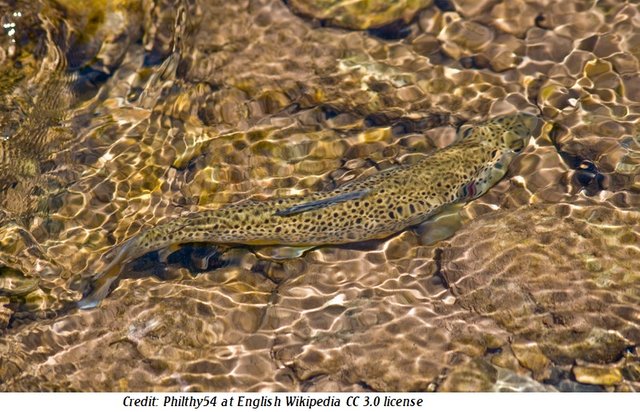
Observed Changes
"... significant decrease in growth rate..." which varied with different levels of exposure.

Turn It Off!!!
Because of all the changes instigated by release of cortisol, there
has to be a point at which this accelerated flow of hormones stops. The
signal to stop occurs when cortisol reaches a certain level in the
bloodstream. The hypothalamus and the hippocampus receive this signal
and begin to end the hormone surge.

Hippocampus (Marked in Red)

Credit: Life Sciences Databases, CC-BY-SA-2.1 license

Cortisol is always present in the bloodstream of a healthy person. It is released in a steady daily rhythm, which peaks in early morning and wanes in the evening. In some conditions, there is too much cortisol...chronically stressed people, for example, may have elevated levels. And there are some conditions in which there is insufficient cortisol. This is the case in Addison's Disease. A deficiency also can result from long-term therapy with GCs.

Fish Get Stressed and Release Cortisol
It turns out, fish have a stress axis, also: the HPI axis. In this axis, the hypothalamus, pituitary gland and interrenal tissue coordinate to release cortisol when a fish is stressed. Recent research has shown that one way to assess long-term stress levels in fish is to measure the amount of cortisol that has accumulated in their scales.
As is true in mammals, cortisol plays a vital role in many life processes of fish.

HPI Axis in Fish
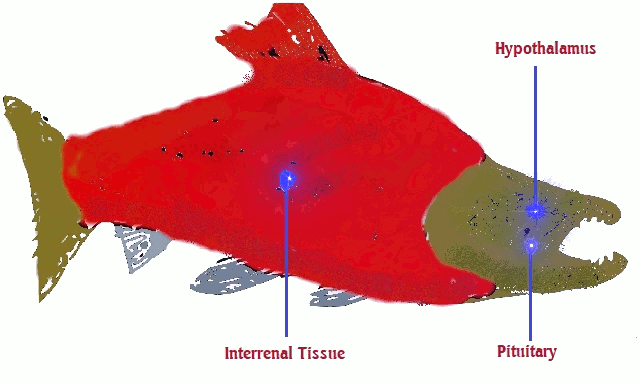


Salmon: research has shown that fluctuating levels of cortisol play a
role in the life cycle of migrating salmon. Young salmon leaving
spawning grounds show spikes in cortisol
as they imprint their surroundings on their olfactory systems. It is
essentially through their olfactory system that salmon will find they
way back to the spawning grounds later in life.



Another example of cortisol in the fish life cycle may be seen in the bluebanded goby. Bluebanded gobies mate in pairs. The female lays the eggs and the male cares for them. Depending on circumstances, male can become female and female can become male. And, unlike many sex-changing fish, bluebanded goby sex transition can be bidirectional.
Cortisol plays a significant role in this transition. Higher levels of cortisol suppress feminization and enhance masculinization.
Bluebanded Goby
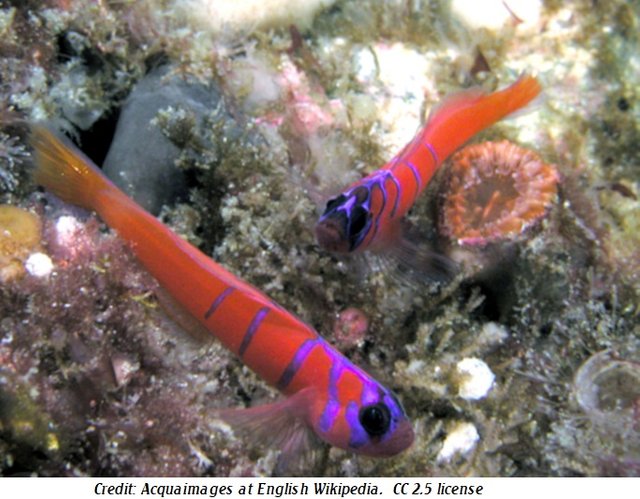


It is because GCs play a vital role in fish development and behavior, that scientists have been looking at the amount of these hormones present in water systems. For example, a 2007 study published in Environmental Science Technology reported that sewage discharge in China contained various concentrations of "prednisone, prednisolone, cortisone, cortisol, dexamethasone, and 6α-methylprednisolone"--all synthetic glucocorticoids.



Another study, from the Netherlands, showed "...high glucocorticogenic activity in waste waters collected at various sites..."
And in yet another study, Japanese researchers found significant presence of glutococoricoids in effluence. Concentrations varied by season and/or water temperature.

In Summary
In 2012, Scientific Reports
published a study that looked at glucocorticoids discharged into water
systems. The findings of this study will serve as a summary for my
blog. Researchers found:
..."previously unrecognized glucocorticoid activity in 27%, and androgen
activity in 35% of tested water sources from 14 states in the US.
Steroids of both classes impact body development, metabolism, and
interfere with reproductive, endocrine, and immune systems. This
prevalent contamination could negatively affect wildlife and human
populations."










Image Sources not Otherwise Credited
Fish Diagram:
Frontiers in Endocrinology
Sam Lin
Pixabay

Fish for GIFs  joakant on Pixabay
joakant on Pixabay

Pulsating light GIF darksouls on Pixabay

Sewage Treatment Plant
wafr onPixabay

End Picture, Seascape Bora Bora on Mariamichelle on Pixabay

Selected Sources Used in Writing This Blog
Science Direct: Glucocorticoids
Science Direct: Effects of the glucocorticoid clobetasol propionate and its mixture with cortisol and different class steroids in adult female zebrafish
Annals of the New York Academy of Science: Fifty years of experience with cortisone therapy in the study and treatment of rheumatoid arthritis
Science Direct: Neuroscience,Glucocorticoids
Frontiers in Immunology A General Introduction to Glucocorticoid Biology
Advances in Experimental Medicine and Biology Glucocorticoids and Cancer
American Laboratory Effective Treatment Strategy for Cytokine Storm in Severe Influenza
Environmental Science Technology Metabolic and reproductive effects of relatively low concentrations of beclomethasone dipropionate, a synthetic glucocorticoid, on fathead minnows
Neuroscientifically Challenged HPA Axis
StatPearls (Internet) Physiology, Cortisol
Journal of Experimental Biology Short-term and long-term effects of transient exogenous cortisol manipulation on oxidative stress in juvenile brown trout
Mayo Clinic Addison's Disease
Integrative and Comparative Biology Cortisol and Pacific Salmon: A New Look at the Role of Stress Hormones in Olfaction and Home-stream Migration
Oceana Bluebanded Goby
Blue Planet Incredible Sex Changing Fish
Frontiers in Neuroscience Stress and serial adult metamorphosis: multiple roles for the stress axis in socially regulated sex change
Environmental Science Technology Occurrence of Natural and Synthetic Glucocorticoids in Sewage Treatment Plants and Receiving River Waters
ACS Publications High-Resolution Mass Spectrometric Identification and Quantification of Glucocorticoid Compounds in Various Wastewaters in The Netherlands
Environmental Toxicology and Chemisty Occurrence of glucocorticoids discharged from a sewage treatment plant in Japan and the effects of clobetasol propionate exposure on the immune responses of common carp (Cyprinus carpio) to bacterial infection
Scientific Reports Prevalent Glucocorticoid and Androgen Activity in US Water Sources
Frontiers in Neuroscience Fluoxetine Exposure During Sexual Development Disrupts the Stress Axis and Results in Sex- and Time- Dependent Effects on the Exploratory Behavior in Adult Zebrafish Danio rerio
Medical Clinics of North America Steroids and the Surgical Patient
The FASEB Journal Gene profiling reveals unknown enhancing and suppressive actions of glucocorticoids on immune cells
Critical Review in Toxicology The hypothalamic-pituitary-thyroid (HPT) axis in fish and its role in fish development and reproduction
Critical Review in Toxicology General background on the hypothalamic-pituitary-thyroid (HPT) axis
Reviews in Fisheries and Science and Aquaculture Maternal Thyroid and Glucocorticoid Hormone Interactions in Larval Fish Development, and Their Applications in Aquaculture
Frontiers in Endocrinology Stress Effects on the Mechanisms Regulating Appetite in Teleost Fish
Your graphics alone are stunning - your bibliography is mind blowing -
and the information! Steroids get flushed into the water supply and ultimately affect body development and interfere with reproductive, endocrine, and immune systems in wildlife and human populations.... this after all the toxins in potatoes (@fitinfun, last week), and polluted air from wildfires, and...
Off to go stick my head in the sand
Thank you for liking my graphics. A gift of Steemit. Art was always a terrain forbidden to me. Then I discovered @shaka's collage contest and began to experiment. Now I take joy in digital creations.
As for sticking our heads in the sand--life was always dangerous, wasn't it? What was life expectancy even a mere hundred years ago? So, don't worry. Be happy. Something will get you someday, but not now :))
Thank you so much for stopping by. I love it when friends read my long blogs.
Haha! The bad news is good news so you can avoid the problems, @carolkean :)
I promise you that avoiding toxins and adding nutrition really will improve your health and life.
I believe you, @fitinfun - and I've made drastic changes in the past ten years. In the Midwest, surrounded by processed food, red meat, nitrites, nitrates, sugar, pastries... beer! pizza! .... @agmoore2, you have so many talents - I would love to learn digital creations even a fraction as good as yours. Please keep writing! I learn so much from you and all of Freewritehouse!
You are really kind...but so creative I think all you need to do is sit down and decide to do it. I have poor hand-eye coordination and poor spatial visualization. Digital art is like therapy :))
Thanks for your encouragement, and I'm amazed you achieve so much with "hand-eye coordination and poor spatial visualization." For me, sewing and painting can be calming, so I believe you--"Digital art is like therapy" for you, apparently spared the techno-glitches that stymie me and freeze me up.


--Oh, I've tried... but maybe not hard enough. My expectations are skewed, living as I do with the uber-competent and talented Man of the House, who makes everything look easy, whereas "real" people may need weeks or months of practice and more practice to achieve mediocrity. He's brilliant. I'm a schlub. But that's ok; I'm a nice, harmless, happy schlub. :)
My work
vs his work:
I love your cats. They have personality 😊
One of the reasons I like digital is because it enables me to go around my deficiencies and still produce a result that matches my imagination (sort of).
I don't think you read my blog about school. You can see there that I early learned to accept my 'wiring' may be a little unusual, but that doesn't mean it's worse.
Differences make us interesting. Don't compare yourself to someone else... truly be yourself and embrace the originality that shines through in everything you do.
I love your stuff and can't believe how fluently ideas and words flow from you.
You're so sweet!! Me, with words flowing fluently...and you said it so poetically.
Off to read your school post now!
Thank you for all the kind words. I treasure them!
You dont publish often but when you do, you rock it. Followed you on Twitter, nice to see that you promote the Steem outside of our lil bubble. I left a small tip on the agmoore2 wallet, I´m too dumb for tipping 😅.
Thank you simply doesn't cover it. Of course, your tip is amazingly generous and appreciated, but more than that your estimation of my work--that rocks.
I don't write often because each time is like a mini course for me. It's more interesting (for me) if I know nothing to start. I learn and explain. Quite stimulating, more stimulating than writing from a knowledge base I already possess.
I do Twitter. You can see I am quite passionate about many causes, though I'm never hostile or aggressive. Steemit is my "quiet space".
It feels very, very good to get your approval--I know how bright you are. (Too dumbo for tipping 😂 😂 I'm glad I know how to post a blog and a comment. Sometimes I mess that up😁)
Thank you again. I'm content now, even if I don't get another comment 🌞
What's in our water is one of those questions we don't like to think about. After all, we have to drink it no matter what and we can't go quarantining every poor bugger who's on medication, now can we? Besides, the water can't be hazardous, sure the government would never allow that!
Our water is fluoridated here so I use a reverse osmosis system that removes most pharmaceuticals.
Really interesting article, as always!
Hi,
Thank you for reading that long blog. I stick in a lot of pretty pictures, hoping to make the info less dry. Plus, I love the pretty pictures.
Yeah, what is in our water.? Even if we buy bottled water, what is in that?
Surprising that so few studies have been done on specific fish species and glucocorticoids. I thought there would be more.
Thanks so much for stopping by and offering your support :)
Hi my dear friend,
I've finally found the time to calmly read your work and leave my thoughts on your comment feed :) It's always wonderful to read the product of your thorough and dedicated research.
Firstly, let me tell you what a great job you did in presenting the HPA axis. Excellent presentation of its components and function. Secondly, I'd like to compliment you on the angle you chose to address this topic : in our systems and in the ecosystems. How smart! :)
Reading your article now has been particularly touching. Only yesterday evening my husband & I went to the cinema to watch Dark Waters. Whenever I hear about a water crisis I think of lack of rain, of dried up underground water ... now, on top of that, I will be thinking of how we're turning our water into a poisonous substance.
It wasn't long ago that I came across a study that identified high amounts of antidepressant medication in tap water Ref., which led me to another study that looks into the presence of detergent in rivers Ref.. They also highlighted the impact these chemicals have on marine life :(
Oh! by the way ... I'm one of your post readers who have used GCs! Thankfully, I don't rely on them anymore to be strong and healthy! :D
Finally, lovely artwork with the illustration my friend. You do know how to deliver a pleasant read to your audience <3
With love & ever growing admiration.
Your Brazilian friend :*
Dear Abigail,
Thank you so much for reading my long blog and taking the time to give such a thoughtful response. I was thinking of you when I wrote (I often think of you, and not just when I write) about the HPA axis and its relationship to chronically stressed people. So many influences stress has in our lives, and here's another.
I'm happy you like my embellishments. These are for the readers, and for my delight. Creating them is a great exercise. So often they don't work out and I have to discard the sorry effort. But, each time that happens I learn, and get better.
Yes, water. Everything stays with us. There was a time when we thought we could just throw stuff away. Now it we know it never goes away, so we need to change, I think, the way we consume and how much we consume.
I do remember you said once that you were ill for a long time in your 20s. I'm presuming that's when you had to depend on GCs. Sometimes, medicine is all that stands between us and illness, or even death. So, I hate medicine, and I love it. I'm happy you are past that time, and good health comes to you without medicinal assistance. (I will confess an intimate relationship with GCs, also).
I am going to look at those references later. Very curious to read the reports, which will augment the many I discovered in my research.
My dear Brazilian friend, finding your comments on my blog is such a treat. I look forward to them. I hope your day (and your husband's day!) is peaceful and fulfilling.
From New York, where at least the illusion of peace presides on a frigid January day,
Love, your friend,
AG
Only way later we learn about consequences of our actions... :/
So nice to see you here, @lemouth. Yes, later. Perhaps we should change the order of things, and learn first? :)
This does not sound very compatible with the human definition :D
Fabulous and intriguing work as always! I sure know the dangers and benefits of these drugs to humans all too well (more on that some other time). That they are affecting even our fish is frightening. Thank you for putting all this together! Everything about it is lovely, despite its dire message.
Hi @owasco,
Thank you so much for reading my blog.
I know your kids have Crohn's and so must be familiar with GCs. What are we going to do? Until better understanding of autoimmune diseases develops, we're stuck using less than ideal remedies. They just control the symptoms and we must tolerate side effects.
Thanks again for the kind assessment of my effort. Very stimulating to write the blog, despite the 'dire message'.
This post has been voted on by the SteemSTEM curation team and voting trail. It is elligible for support from @curie and @minnowbooster.
If you appreciate the work we are doing, then consider supporting our witness @stem.witness. Additional witness support to the curie witness would be appreciated as well.
For additional information please join us on the SteemSTEM discord and to get to know the rest of the community!
Thanks for having used the steemstem.io app and included @steemstem in the list of beneficiaries of this post. This granted you a stronger support from SteemSTEM.
Thank you! Very much appreciated :)
Impressive this post a quite complete investigation. Glucocorticoids are drugs that have served us for many years to treat immunological diseases (lupus, rheumatoid arthritis, among others). And neoplastic pathology especially in chemotherapy schemes. But it is important to take into account the use of these drugs for a long time because it can cause undesirable diseases such as femoral head necrosis, ostioporosis, cushing syndrome, diabetes, among others.
Greetings ;)
Thank you! You write such thorough, informative blogs that this is high praise indeed.
Greeting and peace to you :)
Hey @agmoore2,
thanks for this excellent post. And thanks for approaching the issue of hormone-polluted water. In fact, many people today are exposed to a high concentration of hormones in their drinking water. I always thought its primarily estrogens due to pills for birth control. The GC content is probably even worse because of its immune suppressive activity. Probably there is only one possibility to deal with it: Reduce stress because you can't escape drinking water ;-)
Best regards
Chapper
Hi Chapper,
Yes, we do need water 😅
Thank you for the kind words. A fascinating topic. Seems to me not enough research done on glucocorticoids in water. I thought the information would jump out at me. Had to search for those fish :)
Peace, Chapper, and health
Regards, AG
Shared on Twitter